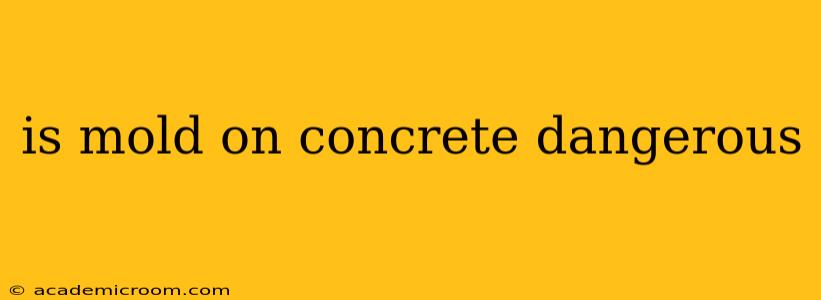Mold growth on concrete, while unsightly, presents a range of potential dangers depending on several factors. It's not simply a matter of aesthetics; understanding the types of mold, the location of the growth, and the potential health risks is crucial. This guide will delve into the dangers associated with mold on concrete and provide solutions for remediation.
What Types of Mold Grow on Concrete?
Many types of mold can thrive in the damp, porous nature of concrete. Some are relatively harmless, while others pose significant health risks. Common culprits include Stachybotrys chartarum (black mold), Aspergillus, and Penicillium. The specific type of mold will significantly influence the level of danger. Identifying the mold species requires professional testing, as visual identification alone isn't always accurate.
How Dangerous is Mold on Concrete to Your Health?
This is a crucial question, and the answer depends largely on the type and amount of mold present, as well as individual sensitivities. Some individuals are more susceptible to mold allergies and related health problems than others.
Health risks associated with mold exposure can include:
- Allergic reactions: Symptoms range from sneezing and runny nose to itchy eyes and skin rashes.
- Respiratory problems: Mold can exacerbate asthma and other respiratory conditions, leading to coughing, wheezing, and shortness of breath. In severe cases, it can cause lung infections.
- Other health issues: Some molds produce mycotoxins, which are poisonous substances that can cause a range of health problems, including headaches, fatigue, and neurological issues. However, the level of mycotoxin production varies greatly depending on the mold species and environmental conditions.
It's important to note that not all mold exposure leads to illness. The severity of the health effects depends on factors like the amount of mold, the duration of exposure, and the individual's immune system.
Can Mold in Concrete Cause Structural Damage?
While mold itself doesn't directly damage the structural integrity of concrete, its presence often indicates a more significant problem: moisture. Excess moisture weakens concrete over time, leading to cracking, spalling, and reduced lifespan. The mold is a symptom of a deeper issue that needs addressing.
How to Prevent Mold Growth on Concrete?
Prevention is always better than cure. Here are some key steps to prevent mold growth on concrete:
- Control moisture: This is the most crucial step. Ensure proper drainage around the foundation, repair any leaks promptly, and use dehumidifiers in damp areas.
- Improve ventilation: Good air circulation helps to reduce humidity levels, making it less hospitable to mold growth.
- Regular cleaning: Regularly clean concrete surfaces to remove dirt and debris that can trap moisture.
- Seal porous concrete: Applying a sealant can reduce the porosity of the concrete, making it less susceptible to moisture absorption.
What Should I Do If I Find Mold on My Concrete?
If you discover mold on your concrete, don't attempt to clean it yourself, especially if it's extensive or you suspect it might be a toxic species. Mold remediation can be hazardous, requiring specialized equipment and expertise. Contact a professional mold remediation company to assess the situation and carry out the necessary steps safely and effectively.
How Much Does Mold Remediation on Concrete Cost?
The cost of mold remediation varies significantly depending on the extent of the infestation, the size of the area affected, and the specific remediation techniques required. It's best to obtain quotes from multiple professional mold remediation companies before making a decision.
Is Mold on Concrete Covered by Home Insurance?
Whether or not mold damage is covered by home insurance depends on your specific policy and the cause of the mold growth. Many policies exclude mold damage unless it's the result of a covered event, such as a burst pipe. Review your policy carefully or contact your insurance provider for clarification.
This information is for general knowledge and does not constitute professional advice. Always consult with qualified professionals for diagnosis and treatment of mold-related issues.
